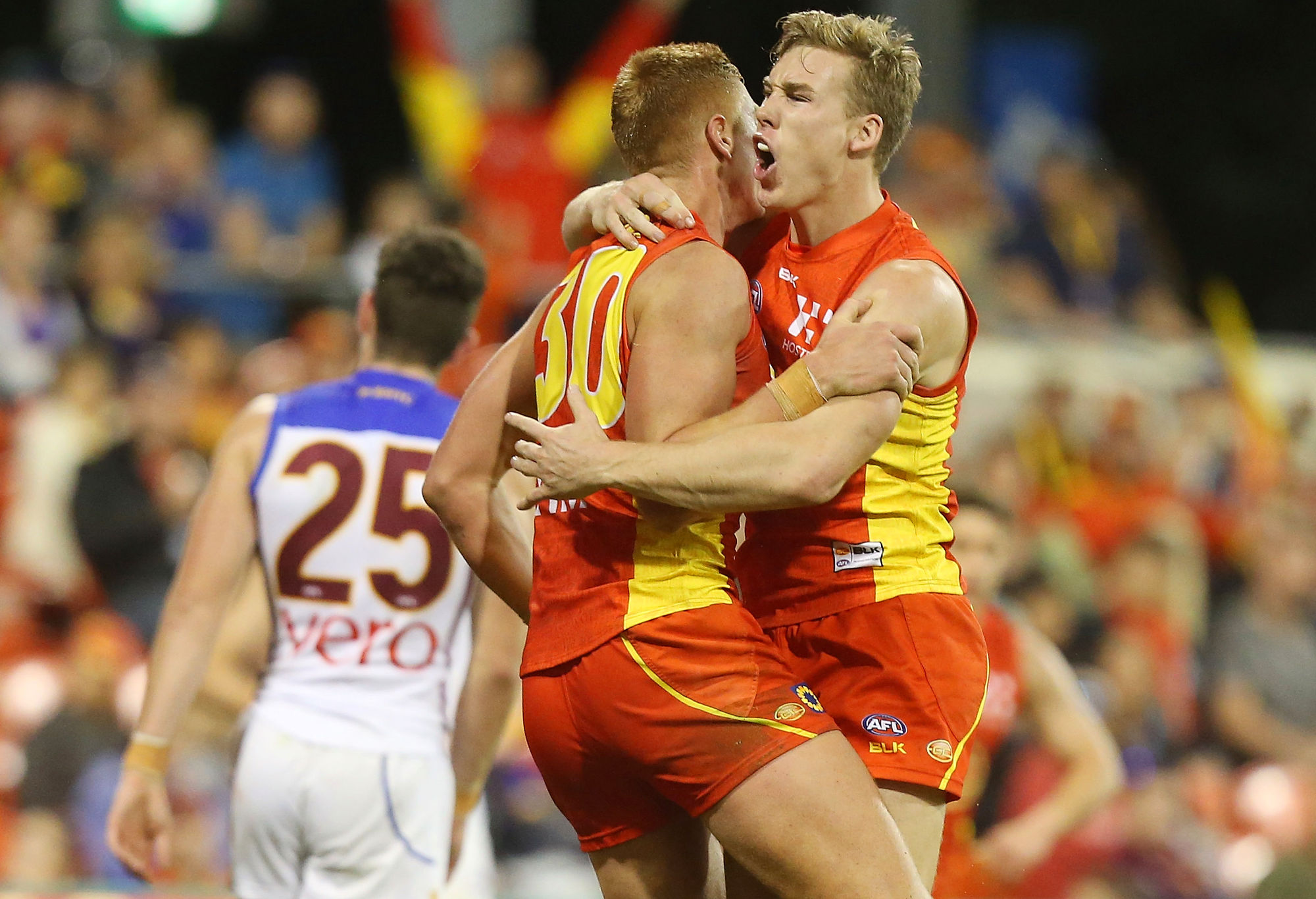What started 2018 as the trade period’s biggest question has become a foregone and almost forgotten conclusion but today, after much ado, Tom J Lynch will become a Tiger.
The free agency window officially opens at 9am today and given how long in advance we’ve know this deal was coming it wouldn’t surprise if Richmond have a press conference scheduled for 9:01.
On Tuesday Gold Coast removed all doubt by posting a statement on their website informing fans that Lynch intended to join Richmond, perhaps hoping to take some of the wind out of the Tigers’ sails.
Certainly Richmond’s signing of Lynch will be a little less triumphant than it might have, but one would imagine that has more to do with their having fallen short at the penultimate hurdle in 2018 than anything else.
Some would argue it’s good news for the competitionn – more accurately, it’s less of a PR disaster for city hall. HQ avoid having to smile and nod as back-to-back premiers recruit the year’s most talked about free agent; but it’s not like this is a victory for equalisation either.
That is, however, a topic for another day. Today instead let’s talk about the Richmond Tigers, and what this signing is going to do for them.
In July I wrote about Richmond’s radical rise from one of our most beloved punchlines to perhaps the league’s next glamour club, theorising that back-to-back flags combined with signing Lynch could put them into the bracket of Hawthorn, Sydney and Geelong.
Indeed for a significant chunk of the year it was a common view among pundits including myself that the yellow-and-black juggernaut would be impossible to stop – but we love revising history, and Richmond’s preliminary final loss has seen public opinion quickly change.
Why did the Tigers fail? The answer is well summed up by this highly prescient tweet from HPN Footy’s Arwon, sent roughly five hours before the preliminary final against Collingwood.
Richmond’s innovative small forward line, intense focus on team defence and in particular forward pressure, along with their willingness to give up the contest with confidence they would get the ball back from opposition mistakes, was a brilliant tactical combination that won them one flag and nearly held out for two.
But, although they were still winning, we saw their form decline in the final month of the home-and-away season as teams started to figure them out. The Tigers were in a race against time to go back-to-back before an opposition side put it all together – and they lost.
Does that mean the Richmond dynasty is over before it even began? Hardly.

(Photo by Adam Trafford/AFL Media/Getty Images)
What’s been often overlooked when Richmond’s ‘smallball’ forwardline comes up for discussion is that it was by no means a calculated tactical masterplan but instead a snappy ad-hoc move that unlocked brilliance – necessity proving once again to be the mother of all invention.
The Tigers repeatedly tried throughout 2017 to force square pegs into round holes looking to fill that second tall forward role alongside Jack Riewoldt, to the point where Todd Elton (yes, Todd Elton) and Ivan Soldo played a combined 13 games trying to make things work.
It wasn’t until Round 22 – just two weeks out from the finals series – that Damien Hardwick finally bit the bullet and decided playing Riewoldt as a lone tall option surrounded by a clutch of ankle-biters was the way to go – and the rest is history.
If you believe the talk then even then the Tigers knew it was only going to be a temporary thing. According to some reports Richmond were already waist-deep in the race for Lynch’s services by this point in time, and confident of landing him.
Maybe that’s true and maybe it isn’t. What we do know for certain now is that Lynch will be at Richmond in 2019, and that gives the Tigers the opportunity for tactical evolution.
It’s not just the fact that Richmond are gaining an elite talent, which no one disputes Lynch is. It’s the domino effect he has on every member of their forward line.
Simply, the addition of Lynch gives Richmond two big targets to aim for when they go forward. It’s going to make them less predictable, and it’s going to make it hard for opposition defences to double or triple-team one of them without leaving the other wide open.
That means Riewoldt and Lynch are both in the frame to have an easier time of it (even if they occasionally steal each other’s goals), but also that they’ll be more likely to bring the ball to ground, where it can be pounced on by the Tigers’ mosquito fleet of Daniel Rioli, Jack Higgins, Dan Butler and Jason Castagna.
In that sense signing Lynch is a much bigger fillip for the Tigers than it would have been for them to pick up say Andrew Gaff or Dylan Shiel. While those players would add more muscle to their existing system, Lynch gives them the point of difference they need to devise a new one.
In short it means Richmond don’t have to rely so much on a tactical ‘gimmick’ any more. They can instead build dominance on the back of having arguably the best forward line in the league, something opposition teams will find it much harder to unravel.

(Photo by Chris Hyde/Getty Images)
That’s the benefit: what are the costs?
Well, for one thing we don’t know for certain yet whether Gold Coast will decide to match the bid that Richmond put in for Lynch.
All signs point towards them not doing so – even Gillon McLachlan has said the Suns are going to get pick 3 in compensation.
The Suns could hypothetically match the bid – they certainly have the cap space to do so – and the Tigers would have to cough up at least one, probably two first-round draft picks.
I think neutral fans would widely agree it would be a much better outcome for the competition as a whole that things played out that way – but it’s not happening.
Instead Richmond will land the year’s most speculated-on free agent without having to give up trade currency of any kind.
Where it will hit them hard, rather, is their salary cap, and that means they’re going to lose depth.
Richmond already have Dustin Martin chewing up $1.2 million per year and adding Lynch on what’s believed to be a seven-year, $7 million deal means they’ll have one-sixth of their entire salary cap invested in just two players.
As things stand now we believe Richmond are going to lose Reece Conca to Fremantle, Sam Lloyd to the Western Bulldogs, Tyson Stengle to Adelaide, and all of Anthony Miles, Corey Ellis and perhaps also Jacob Townsend to the Gold Coast Suns – and they’ll receive effectively the contents of a Bertie Beetle Royal Easter Showbag in return.
None of them individually is any great loss but combined the Tigers lose arguably the group of players they were most likely to turn to in the case of an injury crisis.
Richmond of course have been famed for their ability to keep their side on the park over the past two seasons, and fairly so. Has it been elite performance or just bloody good luck? I suspect even the Tigers’ medical team would be willing to admit it is at the very least a mix of both.
Adelaide for example had a golden injury run in 2016-17 and then seemed to get hit by a karma backlog this year. If the Tigers go through a similar twist of bad fortune in 2019, they may find themselves fielding players less ready for the step up to senior level than they’d like.

(AAP / Julian Smith)
Or hey – maybe not. Probably not, even. More likely I’m just clutching at straws, searching for a negative in the rich getting richer.
Yes, Richmond’s 2018 ended poorly – but they’ll end the season with a sweet taste in their mouths after the arrival of Lynch as they look to their 2019 prospects will remember the words of the great man Meatloaf: two out of three ain’t bad.
The Tigers are at a critical juncture. Their 2017 gameplan was already getting to be old hat as this season drew to a close, and there’s no way it’ll stand up in 2019.
Richmond put a well-below-average 25 per cent of games into players 23-and-under this year and earned only 14 AFLCA votes from that group – the least of any team in the league, bar none. It’s a long way from smoking engine, but the dashboard warning light is blinking.
But the arrival of Lynch at the club gives them the personnel with which to undergo a tactical evolution, and if doing so can take them back to the premiership podium while the awesome foursome are still at their peak, then the dream of joining the ranks of the AFL’s glamour clubs is still very much alive.
































































































